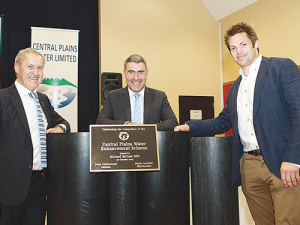Australian teams to help repair North Canterbury irrigators after storm
Moves are afoot to get a team of Australians over here to help repair North Canterbury's irrigation machinery, ravaged by the big windstorm of late October.
 Former National Government ministers David Carter and Nathan Guy attended when Richie McCaw declared stage two of the Central Plains Water Scheme open. Image: Supplied.
Former National Government ministers David Carter and Nathan Guy attended when Richie McCaw declared stage two of the Central Plains Water Scheme open. Image: Supplied.
Canterbury's big Central Plains Water scheme is now fully operational, following the formal opening of stage two by former All Black captain Richie McCaw.
About 300 people gathered for the ceremony at the Darfield Recreation Centre on October 30.
Central Plains Water Ltd managing director Derek Crombie says the scheme was progressively turned on between October 10 and October 15, with no major teething problems. “There’s always little things like fine-tuning pumps and working through all the farm connections to make sure all the interface works between the off-farm infrastructure and the on-farm. Basically it worked the way it should have.”
This means the scheme as a whole is now irrigating about 47,000ha of the Canterbury Plains between the Waimakariri and Rakaia Rivers. Stage 1, in operation since 2015, takes water from an intake on the Rakaia River and services 23,000ha through underground pipes fed by a 17km open canal terminating near Hororata. Stage 2, all underground with 2.5m and 2m diameter glass-reinforced plastic pipes for the main trunks, takes water from the end of the canal to service another 20,000ha in the northeast half of the coverage area.
The physically separate Sheffield scheme, already running for a year, takes water from the Waimakariri to service 4100ha in the northwest corner, from a 2 million cubic metre storage pond near Sheffield.
Crombie says there’d been a surprising amount of interest in buying into the scheme from farmers who had not originally signed up.
“When we started construction we had sold 15,500 shares out of a total of 20,000 available. Since then we’ve sold another 1500 so we’re up to 17,000 active shares. That’s new interest that’s come in.
Former National Government ministers David Carter and Nathan Guy, both staunch irrigation proponents, also attended the opening.
Agrisea NZ has appointed Craig Hudson as it's new chief growth officer.
State farmer Landcorp, trading as Pamu, is a forecasting a full-year net profit of around $100 million.
Tony Aitken, chief executive of Ruralco, has been awarded the Excellence in Business Leadership Award at the ANZ Business of the Year Awards.
Global trade has been thrown into another bout of uncertainty following the overnight ruling by US Supreme Court, striking down President Donald Trump's decision to impose additional tariffs on trading partners.
Controls on the movement of fruit and vegetables in the Auckland suburb of Mt Roskill have been lifted.
Fonterra farmer shareholders and unit holders are in line for another payment in April.